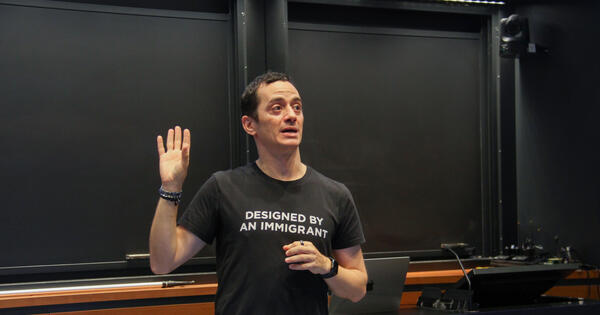On November 6, Social Impact Lab welcomed 2024 Yale World Fellow Tarek Mouganie for a powerful discussion on using technology to drive financial inclusion in Africa. Drawing from his journey in founding Affinity Africa, a digital bank dedicated to providing accessible financial services to micro-, small-, and medium-sized businesses, Tarek shared insights from the challenges and triumphs of building a financial ecosystem for underserved communities.Tarek began the session by reflecting on his early interactions with Yale students (from the Global Social Entrepreneurship course at SOM) who came to Ghana in 2016, observing that some of the most impactful contributions to his work emerged from these student collaborations. Sharing his background as an athlete, a PhD in Physics, and finance expert, he described his return to Ghana a decade ago as driven by a vision for development and financial inclusion. However, securing a banking license for Affinity Africa turned into a grueling 10-year journey, a process he likened to “running a marathon as a sprint, without knowing where your finishing line is.”Addressing the challenges of financial inclusion in Africa, Tarek noted that 86% of the economy remains informal, with many individuals lacking formal addresses, IDs, or payroll systems. Affinity Africa was created to address this need and tap into this significant market opportunity, where 60% of Ghana’s adult population remains unbanked and more than 90% of businesses need access to credit. Affinity’s model prioritizes both social impact and commercial viability, with a mission to make affordable financial services accessible. “Marrying the social element of what we do and the commercial aspect is what drives us,” Tarek shared, underscoring Affinity’s scalable and cost-effective approach to customer acquisition and loan distribution.Tarek also spoke in detail about the role of informed design in developing Affinity’s offerings. Tarek spoke about how his team conducted market research geared toward women in the informal sector to understand the relationship that the most risk-averse subset of their customers had with technology and financial services. This customer-centered approach allowed Affinity to successfully design financial products that are affordable, educational, and, most importantly, accessible for its audience.Looking ahead, Affinity aims to expand internationally, with plans to ramp up lending, fully digitize financial transactions, and implement innovative customer acquisition strategies. As Tarek concluded, Affinity’s mission is about “reinventing the relationship between users and financial services,” making financial inclusion a reality in Ghana and beyond.

